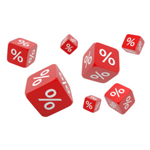Understanding Casino Game Odds
 Everyone knows that every single casino game is based on odds. That's why smart seasoned gamblers take the time to thoroughly understand the math and odds behind each game.
Everyone knows that every single casino game is based on odds. That's why smart seasoned gamblers take the time to thoroughly understand the math and odds behind each game.
Why it's important to know the odds of the games you are playing
Gambling is not purely based on luck. While it's true that luck plays a gigantic role in winning when it comes to gambling, strategy is also important. Implementing a good tried-and-true strategy maximises your chances of winning.
The key to coming up with a good strategy is to understand and calculate the odds. If you don't understand the odds, you might as well be playing the game with a blindfold on. To understand the odds is to understand the game thoroughly.
How to calculate odds
 You don't have to be a mathematician to understand and calculate the odds of a casino game. Here's a basic guide to calculating the odds and selecting the best casino bets.
You don't have to be a mathematician to understand and calculate the odds of a casino game. Here's a basic guide to calculating the odds and selecting the best casino bets.
There are two different kinds of odds you should take into account: the odds of you winning, and the payout odds.
Winning odds
This is the likelihood of your bet winning. For example, the standard single zero roulette wheel has 37 numbers: 1-36 and a single zero. If you bet on one straight up number, your winning odds is 1 to 37 (the chance the ball will land on your number against the chance of it landing on all of the possible numbers).
Payout odds
The payout odds determine how much money you'll receive if you win the bet.
Let's talk about roulette again. Like we discussed before, the winning odds of a straight up number in roulette is 1 to 37. When it comes to payout odds, it's only 35 to 1 (you win $35 for every $1 straight up number bet). It's to give the casino a house edge (more on this later).
Some casino will list the payout odds on the layout (like the craps table or in slot machines). You need to be careful, though. There's a big difference between payout odds expressed in the form of "to" (like 3 to 1) and payout odds expressed in the form of "for" (like 3 for 1).
If the odds are expressed in the form of "to", that means you'll win the former number and the latter number. For example, winning a 3-to-1 bet means you'll get 3 chips and keep the original 1 chip bet.
If the odds are expressed in the form of "for", that means you'll only win the former number and lose the original bet. For example, winning a 3-for-1 bet means you'll get 3 chips but the casino keeps the original 1 chip bet. Basically, a 3 for 1 payoff is actually the same as a 2 to 1 payoff.
So you should always pay close attention to the way the casino phrases the payout odds. If you have to choose between a 3-to-1 bet and a 3-for-1 bet, pick the 3-to-1 bet. You'll be better off placing a bet that pays 3 to 1 instead of a bet that pays 3 for 1.
The house edge
 Here's a tip: you should always go for casino games that offer the lowest house edge. casino have to make their money somehow. If the payout odds were the same as the true odds of winning the bet, then the casino would have no edge. They make their money by paying less than the true odds. The extra money they keep from each bet is called the house edge.
Here's a tip: you should always go for casino games that offer the lowest house edge. casino have to make their money somehow. If the payout odds were the same as the true odds of winning the bet, then the casino would have no edge. They make their money by paying less than the true odds. The extra money they keep from each bet is called the house edge.
Let's talk about roulette again. When you bet on a straight up number, and if you win, you'll get 36 chips while the casino keeps 1 chip. That's a casino house edge of 2.7 per cent.
The trick to maximizing your chances of winning is to go for games with the lowest house edge and the best winning and payout odds.
A lot of seasoned gamblers will tell you to only make bets on games with a house edge of 1.5 per cent or less.
To calculate the odds, you will need to calculate the house edge. Here's how to do this:
Take a look at the true odds and the payout odds. Take the number of chips you're allowed to win (payout odds) and subtract it from the number of chips you could've won if the casino didn't intervene (true odds). Take the remainder, and then divide it by the number of chips you could've won (true odds). The result is the house edge percentage.
Let's say you're at the craps table and you make a pass line bet. The true odds are 251 to 244. The payout odds are 1 to 1 (or 244 to 244).
Now, let's take the number of chips you're allowed to win (244) and subtract it from the number of chips you could've won if the casino didn't intervene (251). You end up with 7 chips. That's the number of chips the casino gets to keep. Take 7, and then divide it by the number of chips you could've won (251). You'll end up with a 2.7 per cent house edge.
The bets with the best odds
It's okay if you're not particularly skilled enough at math to calculate the odds and the house edge yourself. We put together a list of the bets with the lowest house edge. Keep in mind that the stats are for the bet itself, not the overall game.
Blackjack
Best bet: Counter
House edge: Positive (depending on skill, rules, and the number of decks used)
Video poker
Best bet: Perfect Play
House edge: Positive (depending on skill, game type, and pay table)
Video poker
Best bet: Jack or better
House edge: 0.40 per cent
Baccaret
Best bet: Banker
House edge: 1.06 per cent
Craps
Best bet: Don't pass/don't come
House edge: 1.36 per cent
To know which games to play and which bets to place in order to maximise your chances of winning, you need to understand the odds first. It's probably the most important part of gambling.
More Online Casino Topics:
- Beginners Guide
- Top 10 Tips
- High Roller VIP
- Live casino
- Legislation
- Rules
- Glossary
- Advantages of Online casino
- Understanding Odds
- Guide to Winning
- Bonus Guide



